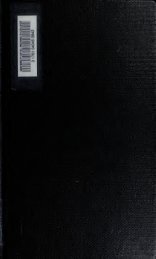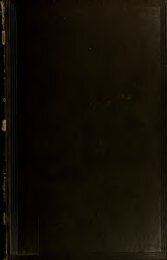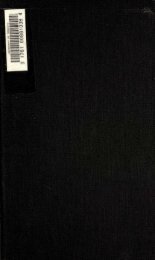Texts from the Buddhist canon : commonly known as Dhammapada
Texts from the Buddhist canon : commonly known as Dhammapada
Texts from the Buddhist canon : commonly known as Dhammapada
You also want an ePaper? Increase the reach of your titles
YUMPU automatically turns print PDFs into web optimized ePapers that Google loves.
g6<br />
DHAAfMAPADA.<br />
inherit one of <strong>the</strong>se ten calamities—ei<strong>the</strong>r a direct<br />
visitation <strong>from</strong> Heaven (by fire, wind, or water)<br />
or, if born, a deformed and dise<strong>as</strong>ed body ; or some<br />
spontaneous fiery outbreak,^ or loss of re<strong>as</strong>on, or<br />
some false accusation'^ or some governmental diffi-<br />
culty, or a gradual loss of worldly substance, or<br />
alienation of relatives, or destruction of tre<strong>as</strong>ure<br />
(crops or grain) by fire or lightning ; and when<br />
dead,, a birth in hell. These are <strong>the</strong> ten."<br />
The dise<strong>as</strong>ed monk hearing <strong>the</strong>se words, convinced of<br />
sin, turned to Buddha and did him reverence, on wMch<br />
he arrived at <strong>the</strong> condition of a Eahat; and <strong>the</strong> Eing<br />
also and bis followers, filled with joy, took on <strong>the</strong>m <strong>the</strong><br />
five precepts, and entered <strong>the</strong> Paths.<br />
2. In days of old, when Buddha w<strong>as</strong> residing in <strong>the</strong> Jeta-<br />
vana, at ^r§,v<strong>as</strong>tl, and preachiag his doctrine for <strong>the</strong> benefit.,<br />
of men and gods, <strong>the</strong>re were in a country to <strong>the</strong> e<strong>as</strong>tward',<br />
called Uttaravati, a company of 5c3o Brahmans, who had<br />
agreed to go toge<strong>the</strong>r to <strong>the</strong> residence of a certain Nirgrantha<br />
<strong>as</strong>cetic on <strong>the</strong> banks of <strong>the</strong> Ganges, who, by poK<br />
luting bimself with dirt, &c., <strong>as</strong>pired to' <strong>the</strong> condition, of a.<br />
Eishi. On <strong>the</strong>ir way <strong>the</strong>y were overtaken in <strong>the</strong> desert,<br />
with thirst. Seeing a tree, and hoping to find some human<br />
habitation near, <strong>the</strong>y h<strong>as</strong>tened on to it, but when arrived<br />
<strong>the</strong>re <strong>the</strong>y found no sign of life ; on this, <strong>the</strong>y raised <strong>the</strong>ir<br />
voices in lamentation. Suddenly <strong>from</strong> <strong>the</strong> tree <strong>the</strong>y heard<br />
<strong>the</strong> voice of <strong>the</strong> resident Spirit, who <strong>as</strong>ked <strong>the</strong>m why <strong>the</strong>y<br />
lamented so, and on hearing <strong>the</strong> re<strong>as</strong>on, smpphed <strong>the</strong>m to<br />
<strong>the</strong> fuU with drink and meat. The Brahmans, ready to<br />
start onward, <strong>as</strong>ked <strong>the</strong> Spirit what had been his previous<br />
history, that he w<strong>as</strong> thus born ; on which he explained<br />
that havmg gone to <strong>the</strong> <strong>as</strong>sembly of priests in Sr^v<strong>as</strong>tt<br />
when Sudatta had bestowed <strong>the</strong> garden on Buddha, he<br />
1 I cannot translate tliis p<strong>as</strong>sage aatisfaotorily.<br />
;





